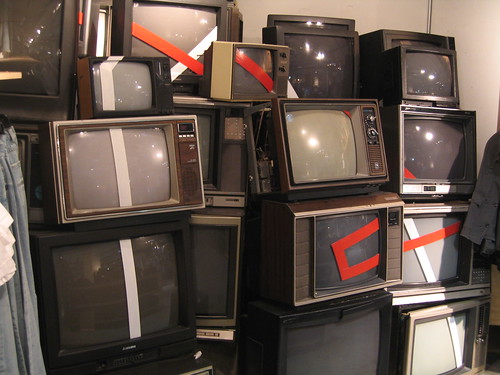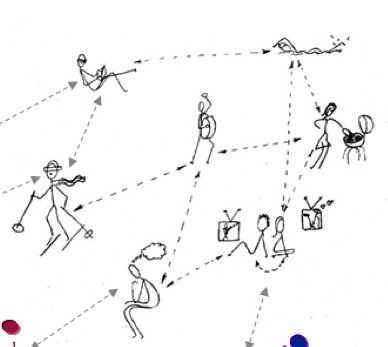
For some reason, a big fat hardback book with a snappy pseudo-scientific title and some choice reviewer quotes seems necessarily authoritative.
Affluenza by Oliver James seems to be such a book. In this tome, Oliver (author of '
They F*** You Up') spends a year of his life interviewing people across the world - from New York to Beijing, from Moscow to Wellington. He argues that he has identified a 'contagious middle class virus causing depression, anxiety, addition and ennui'.
This virus (the Affluenza of the title) is 'obsessive, envious, keeping up with Joneses' - or in other words the human condition of seeking to better themselves by accumulating material possessions and experiences in order to feel better off than others. James argues that as we continually strive to achieve these 'virus goals' our motivations of 'being' are replaced by those of 'having'. And James links the intrinsic motivation 'being' to genuine happiness. Or rather, the motivation of 'having' to such ills as depression, anxiety and ultimately greater social problems such as drug abuse.
James proceeds to go around the world drawing on case studies of individuals to illustrate how the condition of late capitalism (post-post modernity,
velocity age, anyone?) creates ever-increasing desires such as home-ownership and wider conspicuous-consumption that leads to the incubation and growth of the virus. These desires mean we are suckered in by advertising to buy more stuff so we work longer hours, relationships and communities suffer and children are uncared for properly.
Pretty bleak, isn't it? And nice to know that I'm somehow at fault due to my role in the evil advertising industry.
James goes on to suggest 'vaccines' for the virus. These start off as sensible psychologist's therapies: finding intrinsic motivations (i.e. I am a city trader because I am fascinated by numbers and the big fat bonuses are really just a bonus, honest); being beautiful rather than attractive (apparently Russian women are great at this); only consuming what you need; being authentic; enjoying motherhood (& fathers taking a greater child-caring role); educating children rather than brainwashing them. So far so Freud, Jung, etc.
But his finale is quite frankly amazing. He lays out a manifesto not dissimilar to the Socialists of the mid 20th century.
- Return all property to the state (having one estate agent, fixed prices and a lottery system if demand surpasses supply for specific property)
- Tax anyone earning over £100K / year at about 95% to equal out wages.
- Cut all defence budget and reallocate to paying one parent at national average wage to take the first couple of years off following childbirth
- Remove tests / exams from education and divorce syllabuses from the needs of industry - allowing children to discover their true talents
- Ban anyone attractive being in adverts. (seriously! who decides, the 'beauty police'?!)
So a lovely future where we're all doing stuff that we intrinsically love and getting paid enough for it, and living in a place that's just big enough for our needs. (worrying echoes of
lebensraum?!).
What James fails to consider is the very nature of capitalism will necessarily create uneven development. Capital flows from places that don't suit the need to accumulate to places that do. Areas of growth and areas of destruction and deprivation. Even if the UK did seek to employ some of James' measures, the flow of capital (i.e money) away from the UK would be expedient and devastating. The
only way in which James' measures could be employed would be on a global basis. Which is, of course, impractical.
It's a similar argument to that often postulated idea of agencies being paid for pitches - there will always be someone who waives the cost to gain an advantage...
So, in my opinion James has let himself down with the last couple of chapters. They rather smack of 'must finish book for publishers.... must have controversial conclusion'. His arguments are badly thought through compared to the elegant stories of the early part of the book. I can excuse him his methodology - qualitative stories that back up his opinion. Statistically invalid, and no doubt biased in the fieldwork, James is only using a storytelling technique that increasingly popular in authoritative, trans-disciplinary books (see
Gladwell,
Godin,
Grant,
Anderson, etc).
What is the definition of a good book?
Well, I finished it. It made me think. I'm now writing about it. I suggest these behaviours are the result of 'a good book'. A look at the reviews on
Amazon shows very polarised opinions. (but then again, that is the fallacy of Amazon reviews - few people write a review or rate something if they are ambivalent about it).
I like (most of) his thinking. We are often obsessed with material stuff at the expense of genuine happiness. I've noticed that I've changed some of my behaviours in the last few weeks as a result of reading the book (that
iTube is only something I want - not what I need...)
But in the meantime, I must go online to look at those ISA deals I was seeing on the TV - I
must buy a new and bigger flat next year.
 Video documentary of Pakistani and Indian people coming together as friends and family - pleading for their national governments to stop their nuclear ams race
Video documentary of Pakistani and Indian people coming together as friends and family - pleading for their national governments to stop their nuclear ams race


















